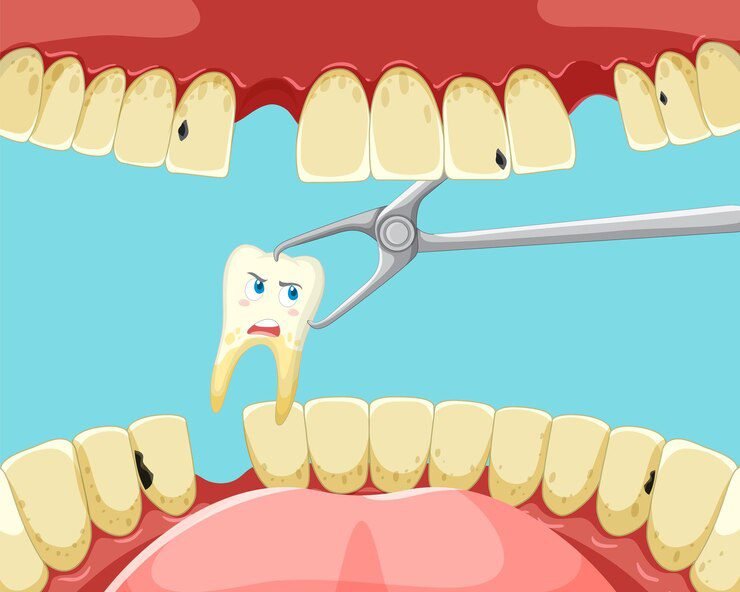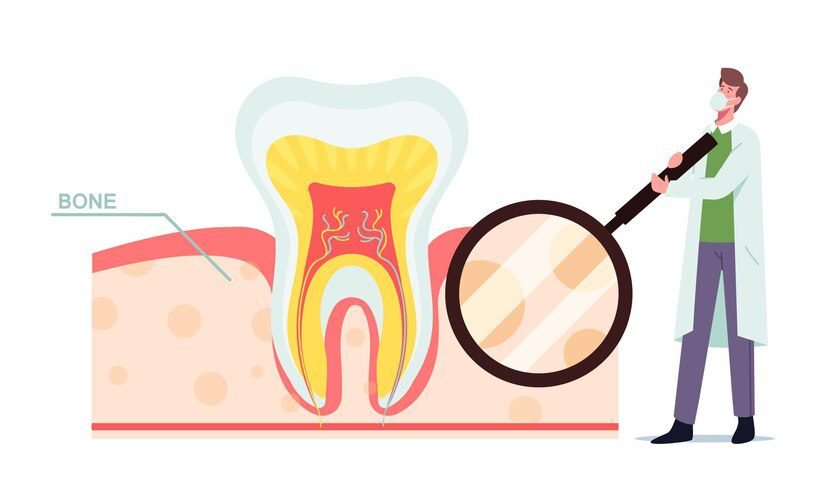Physical Address
304 North Cardinal St.
Dorchester Center, MA 02124
Physical Address
304 North Cardinal St.
Dorchester Center, MA 02124

Understand the causes, treatment, and prevention of chipped teeth.

When it comes to the health of our teeth, what we eat plays a significant role. Biting or chewing hard foods can increase the risk of chipped teeth. Hard foods such as ice, hard candies, or even popcorn kernels can put excessive pressure on our teeth, causing them to crack or break. Even though our teeth are incredibly strong, they are not indestructible.
The repetitive or forceful biting on hard foods can weaken the structure of our teeth over time. This is particularly true for individuals who have weakened teeth due to dental issues, such as tooth decay or existing fillings. It is important to be mindful of the foods we consume and make efforts to avoid excessive force or pressure while biting. Our dental health is closely linked to our overall well-being, so taking care of our teeth by avoiding hard foods is essential in maintaining a healthy and beautiful smile.

Poor oral hygiene habits can have serious consequences for dental health. Neglecting to brush and floss regularly can lead to the buildup of plaque and tartar on the teeth, which can eventually result in tooth decay and gum disease. When plaque is not removed, the bacteria in it produce acids that attack the tooth enamel, leading to cavities. Additionally, if plaque and tartar are not removed, they can irritate and inflame the gums, causing gingivitis and eventually progressing to periodontitis if left untreated.
Furthermore, poor oral hygiene habits can also contribute to bad breath. When food particles are left stuck between the teeth and along the gumline, they can attract bacteria, which release foul-smelling gases and contribute to bad breath. Regular brushing and flossing can help remove these food particles and reduce the occurrence of bad breath. Additionally, maintaining good oral hygiene is important for overall oral health and can help prevent other dental issues such as discoloration, tooth sensitivity, and tooth loss.

Tooth decay and cavities are common oral health issues that can lead to chipped teeth. When tooth decay occurs, it weakens the structure of the tooth, making it more susceptible to fractures. Additionally, cavities that are left untreated can grow larger and compromise the integrity of the tooth, increasing the risk of chipping.
Poor oral hygiene habits play a significant role in the development of tooth decay and cavities. When plaque, a sticky film of bacteria, builds up on the teeth, it produces acids that eat away at the tooth enamel, leading to decay. Regular brushing and flossing help remove plaque and prevent the formation of cavities. Additionally, eating a diet high in sugars and carbohydrates can contribute to tooth decay. These substances provide nourishment to the bacteria in the mouth, accelerating the production of acids. By maintaining good oral hygiene practices and monitoring your diet, you can reduce the risk of tooth decay and, subsequently, chipped teeth.
Dental bonding is a common treatment option for chipped teeth. It involves the use of a tooth-colored resin material that is applied and bonded to the surface of the chipped tooth. The resin material is carefully shaped and sculpted to match the natural shape of the tooth, resulting in a restoration that is virtually indistinguishable from the surrounding teeth. Dental bonding is a relatively quick and affordable treatment option, making it a popular choice for minor chip repairs.
Dental veneers are another treatment option for chipped teeth, particularly for those with more significant chips or multiple chipped teeth. Veneers are thin shells made of porcelain or composite resin that are custom-made to fit over the front surface of the affected teeth. They can effectively cover and hide chips, as well as improve the overall appearance of the smile. Dental veneers are a durable and long-lasting solution, and they can also help to address other cosmetic concerns such as tooth discoloration or misalignment. However, it’s important to note that the process of getting veneers typically involves some enamel removal, which is irreversible.
Here’s a table outlining treatment options for chipped teeth:
| Treatment Option | Description | Credible Source |
|---|---|---|
| Dental Bonding | Composite resin applied to the chipped area, shaped, and hardened to restore the tooth’s appearance. | ADA: Link |
| Dental Veneers | Thin porcelain or composite resin shells custom-made to cover the front surface of the tooth. | Mayo Clinic: Link |
| Dental Crowns | Tooth-shaped caps covering the entire visible portion of the tooth, restoring its shape and strength. | WebMD: Link |
| Enamel Shaping | Minor enamel removal to reshape and correct minor chips. | Healthline: Link |
Dental bonding is a popular and effective treatment option for chipped teeth. It involves the application of a tooth-colored composite resin material to the affected tooth, which is then shaped and polished to blend seamlessly with the natural teeth. This procedure is a non-invasive and relatively quick solution for minor dental imperfections.
One of the key advantages of dental bonding is its versatility. It can not only repair chipped teeth, but it can also be used to enhance the appearance of discolored or misshapen teeth. Additionally, dental bonding can fill in gaps between teeth and even improve the alignment of slightly crooked teeth. The resin material used in dental bonding is highly customizable, allowing dentists to match the shade of the natural teeth, resulting in a seamless and natural-looking smile.
Dental veneers are a popular cosmetic dental treatment that can help improve the appearance of chipped teeth. Veneers are thin shells made from porcelain or composite resin that are bonded to the front surface of the teeth. They are custom-made to match the color and shape of your natural teeth, providing a seamless and aesthetically pleasing result.
One of the key advantages of dental veneers is their ability to effectively cover up chips and cracks on the teeth. The veneer material is strong and durable, providing an extra layer of protection for the damaged tooth. Additionally, veneers can also correct other cosmetic issues such as discoloration, uneven spacing, or misalignment, resulting in a more harmonious smile.
The process of getting dental veneers typically involves two or three dental visits. During the first visit, your dentist will prepare the affected teeth by removing a small amount of enamel to make room for the veneers. Impressions of your teeth will then be taken to create customized veneers that perfectly fit your smile. In the subsequent visit, the veneers will be carefully bonded to the teeth using a special adhesive, and any necessary adjustments will be made to ensure a comfortable and natural-looking fit. With proper care and regular dental visits, dental veneers can provide long-lasting results, giving you the confidence to flaunt your smile once again.
Dental crowns, also known as dental caps, are a common treatment option for chipped teeth. They are custom-made dental restorations that are placed over the damaged tooth to restore its shape, size, and strength. Dental crowns are typically made from materials such as porcelain, ceramic, or metal alloys, and can be color-matched to blend seamlessly with the natural teeth.
One of the main advantages of dental crowns is their durability. They provide long-lasting protection to chipped teeth and can withstand the forces of biting and chewing. Additionally, crowns can improve the appearance of chipped teeth by restoring their natural shape, color, and alignment. This can not only enhance the patient’s smile but also boost their self-confidence. Dental crowns are also known for their versatility, as they can be used to treat various dental issues, including severe tooth decay, large fillings, and root canal-treated teeth.
To ensure the success and longevity of dental crowns, it is crucial to maintain good oral hygiene practices. Regular brushing and flossing can help prevent plaque buildup around the crown and the underlying tooth, reducing the risk of gum disease and tooth decay. It is also advisable to avoid chewing on hard objects, such as ice or pens, as this can cause damage to the crown or the natural tooth structure. Lastly, scheduling regular dental check-ups and cleanings is important for monitoring the health of the crown and ensuring its proper function. By following these preventive measures, patients can enjoy the benefits of dental crowns for many years to come.
Dental implants are a popular and effective treatment option for replacing missing teeth. They are designed to look, feel, and function like natural teeth, providing patients with a long-lasting solution to restore their smile.
The process of getting dental implants involves several steps. First, a comprehensive examination is conducted to evaluate the patient’s oral health and determine if they are a suitable candidate for the procedure. This may include X-rays and CT scans to assess the bone density and structure in the jaw. Once the patient is deemed eligible for dental implants, a titanium post is surgically placed into the jawbone. This serves as a stable foundation for the artificial tooth. Over time, the surrounding bone fuses with the implant, creating a strong and durable bond. Finally, a custom-made crown is attached to the implant, completing the restoration.
Dental implants offer numerous benefits, including improved appearance, enhanced speech, increased comfort, and better oral health. Unlike removable dentures, implants are a permanent solution that does not require any adhesive or removal for cleaning. They also prevent bone loss in the jaw, preserving the facial structure and preventing the adjacent teeth from shifting. With proper oral hygiene and regular dental check-ups, dental implants can last a lifetime, making them a reliable and successful treatment option for patients seeking tooth replacement.
Orthodontic treatment, also known as braces, is a common method used to correct misaligned teeth and jaws. This specialized branch of dentistry aims to improve the functionality and aesthetics of a person’s smile by aligning the teeth into their proper positions. It involves the use of various appliances, such as braces, wires, and rubber bands, which apply controlled forces to gradually move the teeth over time.
Braces can be used to address a wide range of orthodontic issues, including overcrowding, gaps between teeth, overbites, underbites, and crossbites. By exerting gentle pressure on the teeth, braces encourage them to shift into more desirable positions over a period of several months or years, depending on the complexity of the case. Orthodontic treatment can be especially beneficial for children and teenagers, as their jaws are still growing and developing, making it easier to manipulate the alignment of their teeth.
In addition to improving the appearance of the smile, orthodontic treatment can also have significant functional benefits. Properly aligned teeth are easier to clean, reducing the risk of tooth decay and gum disease. They also improve bite alignment, reducing the strain on jaw joints and alleviating issues such as TMJ disorder. Orthodontic treatment can contribute to better overall oral health and enhance a person’s confidence in their smile.
Maintaining good oral hygiene is crucial in preventing chipped teeth. By practicing proper brushing and flossing techniques, you can help strengthen your teeth and reduce the risk of damage. Remember to brush your teeth at least twice a day for two minutes each time, using a soft-bristled toothbrush and fluoride toothpaste. Don’t forget to clean between your teeth with dental floss or interdental brushes to remove plaque and food debris that can weaken the tooth structure.
In addition to maintaining oral hygiene, taking preventive measures during physical activities can significantly reduce the chances of chipping your teeth. If you participate in high-contact sports or engage in activities that increase the risk of dental injuries, wearing a mouthguard is essential. A mouthguard acts as a protective barrier, absorbing the impact and minimizing the risk of dental trauma. There are various types of mouthguards available, including stock, boil-and-bite, and custom-made ones. It is recommended to consult with your dentist to determine the most suitable mouthguard for your specific needs. Remember, prevention is key when it comes to preserving the integrity of your teeth and ensuring a healthy, confident smile.
A mouthguard is an essential piece of protective equipment for anyone participating in sports or physical activities. It is designed to cushion the impact and distribute the force when a blow is struck to the face or jaw area, helping to prevent serious dental injuries such as chipped or broken teeth, lip and tongue lacerations, and even jaw fractures.
Studies have shown that wearing a mouthguard significantly reduces the risk of dental injuries during sports, particularly in contact sports like football, boxing, and hockey. In fact, the American Dental Association reports that athletes who do not wear mouthguards are 60 times more likely to suffer a dental injury compared to those who do. Therefore, it is crucial for athletes of all ages to prioritize their dental health and use a properly fitted mouthguard to protect their teeth while engaging in physical activities.
Hard and sticky foods can pose a risk to your dental health, particularly when it comes to chipping your teeth. These types of foods, such as hard candies, ice, popcorn kernels, and sticky candies, can put excessive pressure on your teeth and potentially lead to cracks or fractures. To prevent this from happening, it is advisable to avoid or limit your consumption of these foods.
When it comes to hard foods, biting down on them can create a significant amount of force that your teeth may not be able to withstand. Additionally, sticky foods have a tendency to cling to the surface of your teeth, making it harder for your saliva to clean them effectively. This can increase the risk of tooth decay and cavities, especially if you do not brush and floss properly after consuming such foods.
Instead of indulging in hard and sticky foods, opt for alternatives that are gentler on your teeth. Soft fruits, cooked vegetables, and dairy products like yogurt are great options that are both nutritious and tooth-friendly. By making mindful choices about what you eat, you can reduce the chances of chipping your teeth and maintain optimal oral health.
Maintaining good oral hygiene is essential for preventing a multitude of dental issues, including chipped teeth. By practicing good oral hygiene, you can significantly reduce the risk of your teeth becoming weak and prone to chips and cracks. Regular brushing and flossing are crucial components of a proper oral hygiene routine.
Brushing your teeth at least twice a day with a fluoride toothpaste helps remove plaque and bacteria that can weaken the enamel. It’s important to use a soft-bristled toothbrush and gentle, circular motions to ensure a thorough clean without causing any damage. Additionally, don’t forget to floss daily to remove plaque and food particles from between your teeth and along the gumline. This helps maintain the overall health of your teeth and gums, reducing the likelihood of chipping or other dental complications.
In addition to brushing and flossing, it’s recommended to maintain a balanced diet that is low in sugar and acidic foods. Avoid excessive consumption of sugary beverages and snacks, as they can contribute to tooth decay and weaken your teeth. If you do indulge in these treats, make sure to rinse your mouth afterwards or brush your teeth to minimize the potential damage.
Overall, by practicing good oral hygiene habits, you can protect your teeth from chipping and other dental problems. It’s crucial to establish a consistent routine and to prioritize your dental health. Regular visits to your dentist for check-ups and cleanings are also essential for maintaining optimal oral hygiene and identifying any potential issues before they become more severe.
Regular dental check-ups and cleanings play a crucial role in maintaining optimal oral health. These routine visits to the dentist are instrumental in preventing the development of various dental issues and ensuring early detection of any underlying problems. During these check-ups, the dentist thoroughly examines the teeth, gums, and other oral structures to detect any signs of decay, gum disease, or other dental concerns.
One of the primary benefits of regular dental check-ups and cleanings is the prevention of dental problems. The dentist can identify any early signs of tooth decay or gum disease and take necessary measures to address them before they progress. Additionally, thorough cleanings remove plaque and tartar buildup, which are often not effectively eliminated through regular brushing and flossing. This helps in preventing the development of cavities, gum inflammation, and other oral health issues. Regular check-ups also allow the dentist to provide guidance on ideal oral hygiene practices and offer personalized recommendations for maintaining a healthy mouth.
Treating dental issues promptly is crucial to maintaining good oral health and preventing further complications. When dental problems arise, such as tooth decay, gum disease, or chipped teeth, seeking professional treatment as soon as possible is essential.
One of the main reasons for treating dental issues promptly is to prevent the problem from worsening. Dental problems, if left untreated, can progress and lead to more severe conditions that may require extensive and costly treatments. For example, a small cavity that is ignored can eventually lead to tooth infection, requiring a root canal or even tooth extraction.
Moreover, addressing dental issues promptly can help alleviate discomfort and pain associated with dental problems. Whether it’s a toothache or sensitivity, seeking treatment promptly can provide relief and improve overall quality of life. Additionally, early intervention can prevent the need for invasive treatments, making the experience more comfortable for the patient.
In conclusion, the timely treatment of dental issues is crucial to maintaining oral health, preventing complications, and ensuring a comfortable experience for patients. By seeking professional care promptly, individuals can address dental problems at their early stages, preventing further damage and reducing the need for extensive treatments.
Using a nightguard for teeth grinding and clenching is a common and effective treatment option. Also known as bruxism, teeth grinding and clenching can lead to chipped teeth, jaw pain, headaches, and other dental issues. A nightguard is a custom-made dental appliance that is worn while sleeping to protect the teeth and alleviate the symptoms of bruxism.
The nightguard acts as a cushion between the upper and lower teeth, preventing them from grinding against each other. It helps to reduce the pressure on the teeth and jaw muscles, promoting a more relaxed and comfortable sleep. By creating a barrier, the nightguard also helps to prevent further damage to the teeth and can even help to correct any existing chipping or wear.
If you suspect that you may be grinding or clenching your teeth, it is important to consult with a dentist. They will assess your condition and may recommend the use of a nightguard. A custom-made nightguard is typically made from durable and comfortable materials, ensuring that it fits securely and does not cause any discomfort during sleep. Proper care and maintenance of the nightguard are important to ensure its effectiveness and longevity.
Overall, using a nightguard for teeth grinding and clenching is an effective way to protect your teeth and alleviate the symptoms of bruxism. It is a non-invasive and conservative treatment option that can provide significant relief. If you are experiencing any signs or symptoms of teeth grinding or clenching, it is advisable to consult with a dentist and explore the use of a nightguard.
Teeth grinding, also known as bruxism, is the act of forcefully grinding or clenching your teeth together. It often occurs during sleep or times of stress.
Teeth grinding and clenching can lead to a variety of dental issues such as chipped teeth, worn enamel, tooth sensitivity, and even jaw disorders.
Nightguards, also called occlusal splints, are dental appliances that are worn while sleeping to protect the teeth from the harmful effects of grinding and clenching. They provide a cushion and prevent direct contact between the upper and lower teeth.
While there are over-the-counter nightguards available, it is recommended to get a custom-made nightguard from your dentist. Custom-made nightguards are specifically designed to fit your mouth and provide better protection.
To properly care for your nightguard, rinse it with water before and after every use. Brush it with a toothbrush and toothpaste regularly to remove any bacteria or debris. Store it in a sturdy container when not in use to prevent damage.
Nightguards are primarily designed to be worn during sleep. Wearing them during the day may interfere with your speech and eating. However, there are specific daytime mouthguards available for individuals who clench or grind their teeth during waking hours.
In addition to wearing a nightguard, stress management techniques, relaxation exercises, and lifestyle changes can help alleviate teeth grinding. In some cases, dental treatments such as orthodontics or dental crowns may be necessary to correct misalignment or restore damaged teeth.
The effectiveness of a nightguard in reducing teeth grinding and clenching varies from person to person. It may take a few weeks or even months to notice a significant improvement. Consistent use of the nightguard is essential for optimal results.
Nightguards are typically not recommended for children unless they have a severe case of teeth grinding or clenching. It is best to consult with a pediatric dentist to determine the most appropriate treatment options for children with these habits.
While wearing a nightguard can provide significant relief and protect the teeth, it may not completely eliminate teeth grinding and clenching. It is important to address the underlying causes, such as stress or an improper bite, for long-term management of the condition.